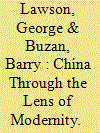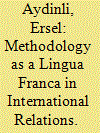|
|
|
Sort Order |
|
|
|
Items / Page
|
|
|
|
|
|
|
| Srl | Item |
| 1 |
ID:
175843


|
|
|
|
|
| Summary/Abstract |
Yan Xuetong’s Leadership and the Rise of Great Powers argues that China should follow moral values in its foreign policy in order to attain international leadership. Drawing on ancient Chinese thought, Yan makes the case that China should strive for humane authority, influencing other states by leading through moral example and attracting supporters through providing benefits rather than using coercion. This essay evaluates the feasibility of China’s attainment of humane authority, which is related to status. Humane authority follows norms consistently toward rivals as well as friendly states whereas a hegemon uses a double standard. But double standards may not be so easily avoided because they derive from inherent psychological bias. The option of acquiring followers by providing them with security guarantees is not available to China in East Asia because of the prior existence of the US alliance system. Yan predicts that China’s growth will lead to a bipolar structure but points out that the conditions for a Cold War are absent. Nevertheless, technological competition between the US and China could lead to a ‘new Cold War’, which would hamper China’s efforts to widen its circle of followers. To be a humane authority, China should also avoid a war with the USA. There is a risk that naval competition could lead to local conflicts as a result of security dilemma dynamics. The two states should control status rivalry through a division of labour, by accepting the other’s pre-eminence in different areas through social cooperation.
|
|
|
|
|
|
|
|
|
|
|
|
|
|
|
|
| 2 |
ID:
175844


|
|
|
|
|
| Summary/Abstract |
This article examines China’s encounter with modernity from the 19th century to the present day. It builds on the historical narrative of modernity developed by Buzan and Lawson (2015), and two theoretical perspectives: uneven and combined development, and differentiation theory. The article opens with a short history of modernity, establishing that it is not a static phenomenon, but a continuously unfolding process. It then explores five periods of China’s encounter with modernity: imperial decline and resistance to modernization; civil war and Japanese invasion; Mao’s radical communist project; Deng’s market socialism; and Xi’s attempt to synthesize Confucius, Mao, and Deng. It explores both how China fits into the general trajectory of modernity, and how it has evolved from rejection of it to constructing its own distinctive version of ‘modernity with Chinese characteristics’. The article ends by reflecting on what issues remain within China’s version of modernity, and how it fits, and doesn’t fit with other forms of modernity already established within global international society.
|
|
|
|
|
|
|
|
|
|
|
|
|
|
|
|
| 3 |
ID:
175845


|
|
|
|
|
| Summary/Abstract |
Although recent scholarship has advanced our understanding of status, little attention has been paid to the factors that shape states’ status-seeking behaviour. Consequently, existing theories are unable to explain why Russia has been more aggressive and confrontational in its status-seeking than China. What is missing is a detailed examination of the ways in which status-seekers’ power trajectories affect their status-seeking behaviour. Whether a status-seeker is rising or in decline shapes its propensity to take risks in pursuit of status, its calculations regarding the utility of attaining more status, and its ability to use non-confrontational and non-aggressive status-seeking strategies to induce other states to accord it higher status. Declining powers, such as Russia, engage in aggressive status-seeking to avoid imminent status losses. Decliners need to initiate confrontations with other states to compel them to recognise their status. Risers, such as China, are more cautious and restrained. Recognising that aggressive status-seeking can jeopardise imminent gains, they are conscious of the costs that accompany elevated status. Their admirable successes and growing power, moreover, make other states all the more willing to accord them higher status. Risers, therefore, can enhance their status without resorting to aggressive or confrontational methods.
|
|
|
|
|
|
|
|
|
|
|
|
|
|
|
|
| 4 |
ID:
175846


|
|
|
|
|
| Summary/Abstract |
A wedge strategy is a state’s attempt to prevent, break up, or weaken a threatening or blocking alliance. An asymmetric alignment consists of a great power (the alignment leader) and a small/middle power (the weaker ally). So when does the wedge strategy of a great power (a divider) towards a competitive asymmetric alignment work? I propose, based upon the ‘Crawford–Izumikawa debate’, an ‘interdependence theory’ of wedge strategies. In the case of an asymmetric alignment that is symmetrically interdependent, the wedge strategy of a divider that accommodates the weaker ally is most likely to succeed. However, a wedge strategy towards an asymmetric alignment that is asymmetrically interdependent is highly likely to fail. I evaluate the theory based upon four wedge strategies adopted in Cold War Asia through analysing American, Russian, and Chinese archival sources. As asymmetrically interdependent, the US–Japan and US–Taiwan alliances offset the impact of Chinese wedge strategies. Between 1955 and 1965, therefore, neither Chinese accommodation nor Chinese pressure could detach weaker American allies from the United States in East Asia. However, China successfully exploited the symmetric interdependence of the US–Pakistan alliance. Between 1962 and 1965, China’s accommodation of Pakistan prevented Pakistan from being used as an American base for containment purposes. Likewise, the Soviet Union took full advantage of the Sino–Vietnamese alignment’s symmetric interdependence, whereby Soviet aid to North Vietnam caused rifts in Sino–Vietnamese relations that eventually wrecked the Sino–Vietnamese alignment. According to the theory, therefore, given the asymmetric interdependence of the hub-and-spokes system, any Chinese attempts to weaken US-sponsored alliances in East Asia would not be effective.
|
|
|
|
|
|
|
|
|
|
|
|
|
|
|
|
| 5 |
ID:
175847


|
|
|
|
|
| Summary/Abstract |
Scholarly dialogue between ‘core’ and ‘periphery’ or ‘West/non-West’ in many disciplinary communities has become an issue of discussion in recent decades, spawned in part by increased expectations in many periphery communities of being published in core journals, and complicated by factors such as the linguistic hegemony of English and concerns about access. The International Relations (IR) discipline has been at the forefront of this discussion. However, despite widespread awareness of the issue, and a dedicated push for greater emphasis on local theorising out of the periphery, the cutting edge of global IR scholarship still remains core dominant. This article proposes that a focus on ‘quality’ methodology, in the broadest possible sense of having transparent and effectively applied research designs, could serve as a lingua franca to promote the exchange of ideas in a way less prone to disadvantage periphery scholars. The article goes on to examine this issue by focusing on the case of the Turkish IR disciplinary community. It looks at how methodological issues are currently considered in Turkish IR pedagogy and scholarship and then offers a self-reflective assessment of the quality of methodology in Turkish IR. It concludes by offering suggestions on how the Turkish IR disciplinary community could better address methodological issues and, ultimately, perhaps achieve greater impact within the global IR community.
|
|
|
|
|
|
|
|
|
|
|
|
|
|
|
|
|
|
|
|
|